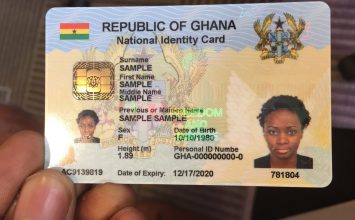National ID card will boost domestic revenue – NIA
 Mr Abdul Ganiyu, the Director of Training at the National Identification Authority (NIA) on Thursday said issuance of the country’s National Identification card would boost domestic revenue mobilisation.
Mr Abdul Ganiyu, the Director of Training at the National Identification Authority (NIA) on Thursday said issuance of the country’s National Identification card would boost domestic revenue mobilisation.
He said a comprehensive national register would bring all Ghanaians to the centre through formalisaion and digitisation of the economy in a way that would promote the easy way of doing business in the country.
Mr Ganiyu said this in Accra at a stakeholder engagement on addressing inequality through a harmonised national identification system organised by African Centre for Energy Policy supported by Oxfam Ghana.
He said the National ID Card registration form incorporated the Tax Identification Number and the Personal Identification Number (PIN) to enable the Ghana Revenue Authority (GRA) properly target individuals through access to the NIA database.
Mr Ganiyu said exporters and importers who were holders of the National ID card would be linked directly to their PIN, which would help eliminate fraud and theft in the shipping and clearing of goods at the ports and harbours.
According to him, business registration would be linked to the national ID card holder’s PIN to help identify them as the true owner of a business, stressing that the Registrar General’s Department would make it a requirement for all business owners to provide their PIN on the card during business registration.
“In order to ensure financial inclusion in bridging the inequality gap, holders of the card will be required to provide the card as an identity verification document when opening bank account, withdrawing money or receiving money transfers in the country.
“This will make it easier for a national card holder to take a loan from the bank whether they work in an identifiable institution or not because his or her identity can be easily verified,” he added.
Mr Ganiyu said the card would become mandatory for the validation of all payments and government was working through the Financial Interpretability Platform to link all financial institutions to enable them share information easily as they serve their customers.
Dr Magnus Ebo Duncan, Director of Policy, Institute of Fiscal Studies, addressing inequality through government fiscal policies explained that fiscal policy was the primary tool for government to affect income distribution.
He said fiscal policy could promote equality of opportunity and greater intergenerational mobility, stressing spending that focused on increasing access to education and health can enhance social mobility and help break the intergenerational transmission of poverty.
He noted that the country collected approximately 55 per cent of its taxes from indirect taxes, that included VAT, excise duties and customs duties, which had been found globally to be regressive, and around 30 per cent of its tax from VAT.
Dr Duncan stressed that this regressive nature of taxation means that the poor paid the same effective tax rate as the rich, which he believed had worsened the plight of the poor and the vulnerable.
He called on government to invest in the GRA to explore and deepen its effort in raising more revenue from progressive taxes.
Source: GNA
